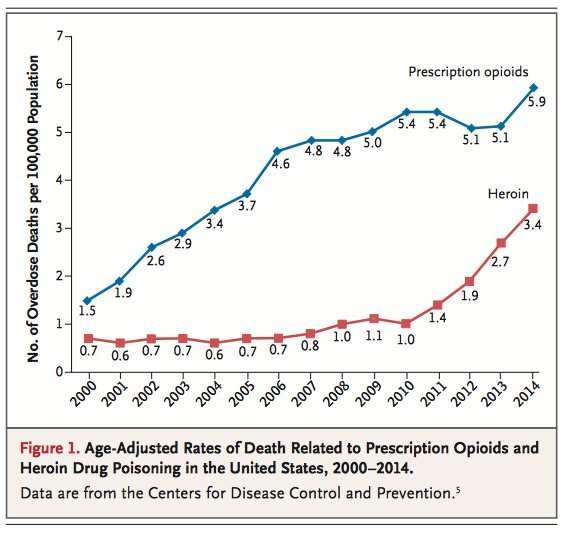If it seems like you’ve been hearing more and more about the heroin and prescription opioid epidemic (e.g., oxycodone, hydromorphone, morphine, and illicitly made fentanyl) in the news lately, you’re not alone. Over the last several months, this important public health issue has hit the mainstream. HBO ran a special called “Heroin: Cape Cod, USA” that shed light on the addiction problem across the country, focusing on eight families in Cape Cod, Massachusetts. The topic has been mentioned by both Republican and Democratic presidential candidates in debates and town halls. There is even legislation currently making its way through the Senate to address the “opioid-heroin epidemic that is sweeping the country.” This epidemic affects all of us.
Fighting Moral Decay in Residency
Residency – especially intern year – can be compared to the trenches of war. You are enlisted for a period of time, while you dutifully carry out the orders of superiors, and fight the enemy (disease) while you tend to the already wounded and dying. It removes you from your normal life and can send you into unknown territory, consuming the vast majority of waking hours (sometimes as high as 100-120 hours per week, which is the rarely discussed loophole within the rule of “[no more than] 80 hours per week averaged over a 4-week period”). It can be doubly isolating because the only people who really understand your experience are your compatriots – the co-interns and co-residents fighting in the trenches alongside you. Further, doctors in training, like our veterans, suffer from psychiatric illness and substance abuse issues, but this doesn’t garner much attention unless there is a string of suicides or high-profile articles on the subject. (Time Magazine also ran a story about it in September 2015.) (more…)
Transitions of Care, or Improving Your Health At Home
When explaining the role and importance of public health to my colleagues, I like to jokingly point out that, ideally, patients spend most of their lives outside of the hospital. Though my tone is sarcastic, my sentiment is honest. Most of what happens to people that keeps them healthy or makes them sick happens outside of the hospital setting. One’s habits, lifestyle, home and work environment, level of education, and financial means all influence one’s trajectory of health more strongly than most hospital-based care can. These social, behavioral, and structural determinants of health often make the difference between a person whose health will maintained outside of the hospital and a person who will require repeat hospital visits.
The structural determinant of health that I will discuss in this post is one that I have confronted on a daily basis in the hospital – that of continuity of care, or barriers thereto. The fragmented nature of our healthcare system and the game-of-telephone-like way that information gets passed from one link in the healthcare chain to the next is a major reason that patients’ health and healthcare suffers from systemic discontinuities between hospital, rehab, clinic, and home or facility.
(more…)Things I’m Reading: Mental Health Edition
Here’s a quick run-down of some of the things I have been reading lately:
- Buzzfeed.com: What is the real toll of war on our veterans? A beautiful photo series highlighting what it’s like to live with PTSD. For another take on living with and living through a traumatic experience, see my recent post about the broken and yet unbreakable Kimmy Schmidt.
Another Day, Another Dead
The recent new stories of Sandra Bland, the teenager in McKinney, TX, and Samuel DuBose have yet again ignited national discussions of race, police brutality, and reform. During the Baltimore riots a few months ago in response to the death of Freddie Gray, I had jotted down some thoughts and feelings about privilege, power, and systemic injustices but never posted it. Then time passed, and it didn’t seem as current or relevant to be posting about Baltimore. We had Charleston, South Carolina and other cities to worry about. Without meaning to, I fell subject to the same pressures and cycles of the popular media. As is sadly commonplace these days, the round-the-clock on-the-ground coverage of Baltimore’s plight is gone, and the media furor passed quickly to the next big topic; Baltimore’s saga has since garnered scarcely more than a mention.
I therefore take this time to reflect on how far (or not) we have come since the Spring. The officers involved in this incident may have been indicted, but this does not close the chapter on Baltimore’s struggles and anguish. It bears revisiting. Not just for those in Baltimore, but for those in Charleston, SC and now Cincinnati, OH wrestling with the same injustices. (more…)
Resolution: Make Trans* Health A Priority
Do you want to know more about transgender health issues and be better prepared to take care of transgender individuals? Read on.
Let’s START at the very beginning
An important development in the worldwide treatment and care of HIV-infected individuals was announced earlier this week. Read on to find out what this means for HIV treatment practices moving forward…
Food As Its Authentic Self
“The species of animal you eat may matter less than what the animal you’re eating has itself eaten. The fact that the nutritional quality of a given food (and of that food’s food) can vary not just in degree but in kind throws a big wrench into an industrial food chain, the very premise of which is that beef is beef and salmon salmon.” – Michael Pollan (more…)
The Kimmy Isn’t All Right
“Life beats you up. You can either curl up in a ball and die, or you can stand up and say: ‘We’re different, and you can’t break us!’”
Read on to learn about the next big show you should be watching. (more…)
Maternal Mortality in the Peruvian Amazon
As part of my Global Health elective in Iquitos, Peru through the Ben Gurion University Medical School for International Health, we have been learning about the maternal health issues particular to this part of the world. “Improve maternal health” is one of the mandates of the WHO’s Millennium Development Goals, and it is ever so relevant here in Peru, where the maternal mortality rate (MMR) – though declining – is 89 maternal deaths per 100,000 live births and is higher than neighboring South American countries. It is an issue that has been highlighted by many groups and publications such as HealthAffairs, Physicians for Human Rights, and Amnesty International.






